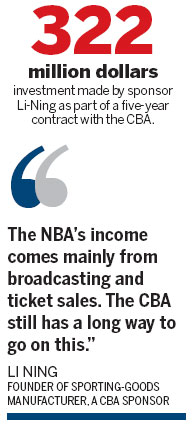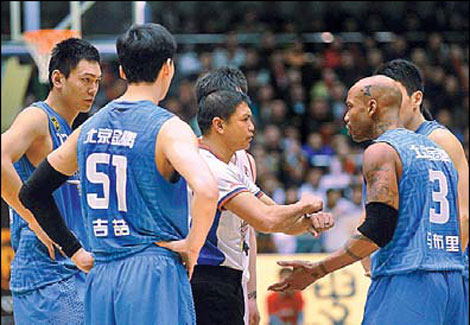Owners, sponsors grapple with CBA's unrealized potential
Updated: 2013-04-02 07:51
By Sun Xiaochen (China Daily)
|
||||||||
|
Stephon Marbury (right) of the Beijing Ducks argues with a referee during the team's semifinal against the Shandong Golden Lions. Poor officiating has become a major issue in the CBA. Cui Meng / China Daily |
Has the time come for major changes in the China Basketball Association?
Despite a boom in media and sponsorship interest, a growing number of teams are calling for structural changes to the league.
The CBA season concluded on Friday with the Guangdong Southern Tigers claiming their eighth title in 10 years, drawing solid TV ratings and attendance during their sweep of Shandong.
Big-name imports like Tracy McGrady and Gilbert Arenas helped draw a reported investment of $322 million from sponsor Li-Ning, while a crop of young Chinese players emerged as potential stars.
Still, the CBA has a long way to go to reach its potential as a professional league.
Some owners think decision-making power needs to be decentralized.
"We are running this more like a government than a professional league," Shanghai Sharks owner and former NBA All-Star Yao Ming told Xinhua recently.
"The management rights should return to the league committee, which is composed of club representatives. That would allow policies to truly be made based on the actual situation and need of clubs.
"Now, the basketball association is the only decision-maker, while (the clubs) have very limited influence on making any major rules, despite the presence of the committee. Usually, we just follow along with whatever they decide."
Begun as a State-run system in the 1990s, the CBA has retained full control of all major decisions, on everything from hiring a promotional agency to upgrading stadiums.
"I think it's time for some radical changes, like releasing all rights to the clubs. It's the time to establish a league council made up of the owners, like the NBA's board," Zhejiang Lions manager Ye Xiangyu told China Daily recently.
Many teams would prefer to extend the length of the season.

To guarantee enough preparation time for events like the Olympics and the World Championships, the CBA cut its season from 50 games to 32 in 2009. The move was made to appease the governing body, which places a premium on success in the Olympics.
With so little time to market the league, clubs and sponsors lose out on money from ticket sales, merchandising and promotional activities.
"It's like you made a movie with a huge budget, but they only allow you to screen it twice," Yao said. "That's bad for the investors."
Ye agreed with Yao, adding that most teams expect the season will be extended in the future.
Sponsors are hoping for a bigger stage and more opportunities to promote their brands.
Thanks in part to its hefty investment in the CBA, sporting-goods giant Li-Ning lost $322 million, according to its 2012 annual business report released last month.
"We are looking for long-term success with the CBA and we expected the loss from the beginning," Li Ning, founder of the company and a former Olympic champion gymnast, told Guangzhou Daily recently. "The NBA's income comes mainly from broadcasting and ticket sales. The CBA still has a long way to go on this."
The officiating in the CBA also needs improvement. Controversial calls have drawn fierce complaints from crowds and players.
The league banned three referees for poor performance, which caused a long break in a game in January and ended with McGrady being fined for protesting the call. The penalty for the referees was the first in 11 years.
"The CBA has to introduce video replays for the whole season (which are currently used in the playoffs) to assist the referees. The rules need to be stricter, and the penalties should be more severe," said renowned commentator Yang Yi.
Still, governing-body officials don't seem eager to make any changes quickly.
"We've heard different views on the reform from everywhere," Bai Xilin, the director of the CBA's competition department, said. "The current mode has been tested by many years of operation. It's good to have suggestions, but we need more discussion and research before taking action."
sunxiaochen@chinadaily.com.cn
(China Daily 04/02/2013 page24)

 'Taken 2' grabs movie box office crown
'Taken 2' grabs movie box office crown
 Rihanna's 'Diamonds' tops UK pop chart
Rihanna's 'Diamonds' tops UK pop chart
 Fans get look at vintage Rolling Stones
Fans get look at vintage Rolling Stones
 Celebrities attend Power of Women event
Celebrities attend Power of Women event
 Ang Lee breaks 'every rule' to make unlikely new Life of Pi film
Ang Lee breaks 'every rule' to make unlikely new Life of Pi film
 Rihanna almost thrown out of nightclub
Rihanna almost thrown out of nightclub
 'Dark Knight' wins weekend box office
'Dark Knight' wins weekend box office
 'Total Recall' stars gather in Beverly Hills
'Total Recall' stars gather in Beverly Hills
Most Viewed
Editor's Picks

|

|

|

|

|

|
Today's Top News
Boston bombing suspect reported cornered on boat
7.0-magnitude quake hits Sichuan
Cross-talk artist helps to spread the word
'Green' awareness levels drop in Beijing
Palace Museum spruces up
First couple on Time's list of most influential
H7N9 flu transmission studied
Trading channels 'need to broaden'
US Weekly

|

|








